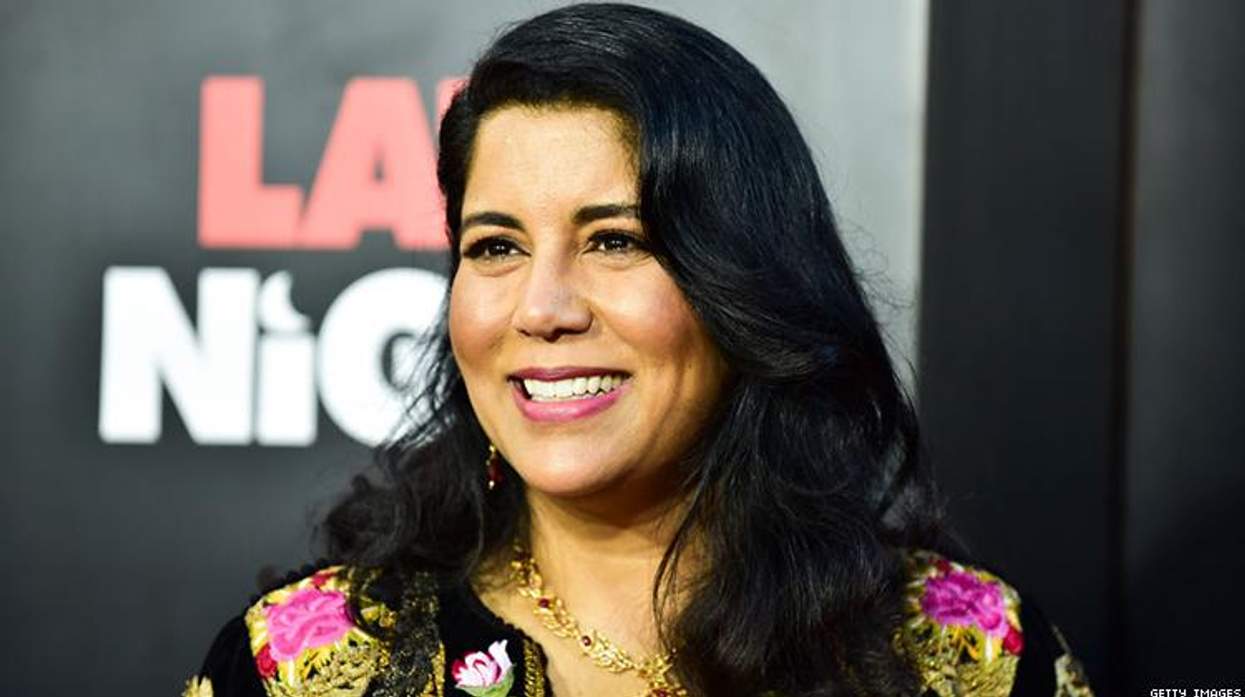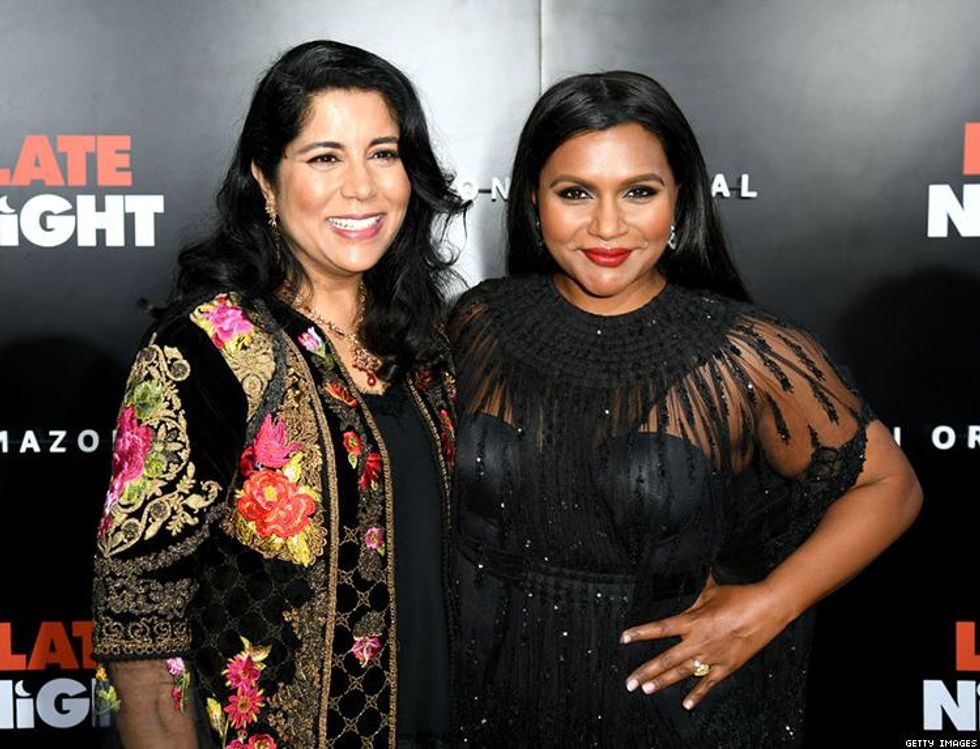It's been 20 years since director Nisha Ganatra's Chutney Popcorn -- one of the first films to go beyond the coming-out story and merge narratives of queerness with family and cultural identity -- won the audience award at Los Angeles's LGBTQ film festival Outfest. A prolific TV director and an Emmy nominee who was on the ground floor of Transparent's first season, Ganatra recently helmed the Mindy Kaling-Emma Thompson comedy Late Night, and she's currently finishing her first studio film. It's a fitting bookend of the past two decades for Ganatra and Outfest that the festival, which she enjoyed as an audience member before her first film's win, is honoring her with this year's Achievement Award.
At the time Ganatra was ironing out the logistics of making an indie lesbian-themed film in the late '90s -- in the glow of New Queer Cinema but long before the current heyday of LGBTQ representation (of which she is a part) -- she sought to tell stories that were reflective of various experiences, including hers as a queer Indian-American woman. Chutney Popcorn is landmark LGBTQ cinema that vaulted Ganatra into becoming a major player in amplifying the voices of LGBTQ people. Her work since that film has continually given voice to marginalized groups, but she doesn't take the mantle of being called a pioneer lightly.
"At the time it was just telling a story that I felt like I really wanted to see," Ganatra tells The Advocate. "We were dealing with the basic fact of the lack of representation and so, 'What can we do to solve that? How can we increase visibility and representation?'"
There had been a wave of LGBTQ-themed films in the late '80s and early '90s, many of which told the near-universal origin story of coming out. Outliers like Go Fish and The Watermelon Woman were early titles that moved beyond coming-out narratives, but while Ganatra worked to get to the next level of representation, she credits those early coming-out films with having paved the way to new kinds of stories.
"We did get to stand on the shoulders of [films including] The Incredibly True Adventures of Two Girls in Love. We got to sort of take for granted that people had seen a lot of coming-out stories and we could just go to the next level of, 'OK, you've seen the coming out experience,' Ganatra says.
"There's always that first wave of movies that are just about the experience. And then the second wave of movies that get to dive deeper into more individual stories of reflection."
In Chutney Popcorn, Ganatra told the story of Reena, a lesbian who becomes a surrogate for her sister Sarita (Sakina Jaffrey), who's unable to become pregnant and who desperately wants a baby with her husband. Reena's devoted girlfriend, Lisa (Jill Hennessy), helps her navigate the process of carrying her sister's child in the affirming comedy about love and family. Because of a dearth of Indian-American actresses and actors in general who were willing to play a lesbian at a time when it was still considered risky, Ganatra stepped into the role of Reena while also directing her first film.
"If I were to make it today, I would have so many choices and an embarrassment of riches of talent to pick from," she says.
Twenty years later, she's still working within various constraints in Hollywood. There's a sweet Easter egg in Late Night for fans of Chutney Popcorn, but Ganatra laughs and says the film's presence in her latest movie came out of a need to keep costs down. The poster for Ganatra's film pops up in a scene with Kaling's character Mollie in her niece's bedroom. Ganatra wanted a Bollywood poster as part of the mise en scene, but because the clearance rights were so high she offered up the Chutney Popcorn poster, which she owns.

Nisha Ganatra and Mindy Kaling
Currently, Ganatra is in post-production on her first studio film, Covers, about the music industry, which stars Ice Cube, June Diane Raphael, Tracee Ellis Ross, and Dakota Johnson. In the intervening years since her first feature and Covers, Ganatra ventured into reality TV as a director for The Real World in 2001 before eventually making a name for herself directing three episodes of the watershed series Transparent's first season. She's since directed episodes of prestige TV including Mr. Robot, Shameless, Better Things, Dear White People, and Black Monday.
While she worked steadily in the early aughts, Ganatra credits Jill Soloway's Transparent with helping to bring her back to her beginnings.
"I started my career telling really truthful stories and then I got a little bit lost along the way. And did great with Cosmopolitan [her 2003 movie about a lonely Indian-American man] with telling the Indian-American story and then got into Hollywood land and got a little lost in the weeds a bit," Ganatra says.
"You can't make these things, you can't tell these stories," was the refrain she heard from Hollywood executives about the stories that mattered to her. "You're told 'no' so many times that your brain just starts closing those doors on itself. I think that has been the most shocking, amazing revelation. 'Oh, I closed the doors and I didn't have to.'"
"Transparent was a big part of that reopening and realizing that the culture of the business had changed. There is funding to tell these unique stories," she says. "The streaming space has allowed for what independent film used to be. It feels like the current wave of '90s indie film is happening on streaming now."
With a few decades of directing behind her and having emerged from a place of relaying stories of marginalized communities, Ganatra is perfectly positioned to identify where Hollywood is headed in terms of increased representation for underserved communities.
"There are two sorts of big movements that I'm witnessing that are moving and encouraging -- one is the incredible inclusion of LGBTQIA in mainstream television and also in cinema. Not just as the comic relief character but as legitimate storylines," Ganatra says. She qualifies that there are still not enough "A" or main storylines about queer people but that the secondary or "B" storylines are more and more about "three-dimensional characters that you care about and who have arcs."
The other positive trend Ganatra sees is in the diversity and the inclusion of South Asians and Indian-Americans.
"When I made Chutney Popcorn, I had a sort of double agenda of 'I haven't actually seen the Indian-American experience portrayed on-screen yet. I've seen movies about South Asians and Indians, but not the Indian-American experience,'" Ganatra says. "That was something that is also really mind-blowing when you think that The Mindy Project is an NBC show with the South Asian Indian lead character. That was just not possible at the time of Chutney Popcorn."
Ganatra was drawn to Late Night in part because Kaling's script about an Indian-American woman who reinvents herself as a comedy writer for a late-night TV show in what is essentially a trial by fire mirrored her experience of making Chutney Popcorn when she was learning scriptwriting and directing on the fly.
"What feels like the most success in the next level of filmmaking is not that the stories are being told, but they're being told by the people who experienced them," Ganatra says of collaborating with Kaling on the film that was the record-breaking sale at this year's Sundance Film Festival.
While calling that kind of representation a "success," she also says it's kind of sad that in 2019, the idea of filmmakers getting to tell their own stories is still "weirdly radical."
"It's funny, I guess, to be a part of [something] where you're simultaneously appreciative of the ease and change and equally frustrated that it didn't come sooner," Ganatra says of her place in Hollywood's evolution on visibility.
But Ganatra is encouraged by increased spaces for women, queer people, and people of color, even if the change ebbs and flows.
"I definitely have the lesbian TV series that I've always wanted to make and never thought I'd get funding for," she says. "Now I'm thinking, Hey, I better just put pen to paper and get that out before things change again."
Ganatra will be honored at Outfest's Closing Night at the Theatre at Ace Hotel in downtown Los Angeles.






































































Charlie Kirk DID say stoning gay people was the 'perfect law' — and these other heinous quotes